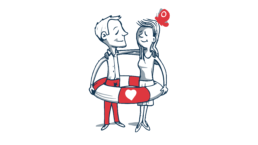No-One is One Dimensional
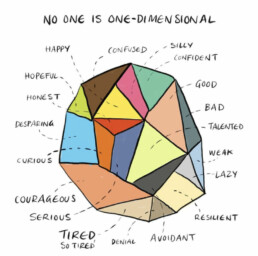
We love this picture by Sarah Firth as it is great reminder that real people are everything other than one-dimensional.
Sometimes your perception of a person because of one of their personal traits can affect your feelings about them and their behaviour. We must remember that someone who appears to be resilient can also be confused and tired. Someone who comes across as silly can also be curious and talented.
We need to listen more, ask the right questions, and really get to know people, which we are all getting better at in this one-dimensional world of virtual interactions.
You Can't Beat Sleep
Does one or both of the following scenarios sound familiar to you:
You have had a great night’s rest, are feeling refreshed, and are starting the next day full of enthusiasm and energy.
You have had a bad night because you did not sleep well or frequently woke up because a previous or upcoming project was on your mind.
Most of us experience both over time. We need to take care to embed individual routines into our days or evenings that enable us to sleep well. Having a good night’s sleep hugely effects how we turn up as a person and a leader and impacts those around us that we care for.
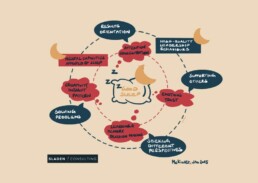

The Fake Commute


We have heard this mentioned a lot in discussions with colleagues and clients recently – and love the idea of a fake commute! For many of us working from home is set to stay (at least for part of the week). Whether you walk around the block and buy a coffee from your local cafe, or go for a cycle, it is important to have some time for yourself before you start your work day at home, and when you finish your day.
The commute used to give us thinking time to prepare ourselves on the way to work, or to wind-down on the way home; we all need to find some tools to continue to do this, and a fake commute might be just the thing.
What tricks and tips can you recommend to ensure your work day does not blur with your home and family time?
Trust is the Magic Ingredient


Every team we have ever worked for says trust is critical. Why then, in most teams is trust not where it should be?
Never before has trust been so important for the world. We know that concentrated and honest conversations amongst colleagues about trust is vital in supercharging your team to high performance. At Sladen we practice what we preach.
Choose any framework to kick-start the journey. For example check out this brilliant TED talk by Frances Frei.
If you are honest on a scale from 1 to 10, how trustful are relationships in your team?
The Trust Equation
In every team building, bonding session or team effectiveness workshop we have ever run, the word trust comes up. Everyone knows the importance of having a high trustworthiness within a team. But how do you build trust? What are the key elements that make it up? How do we focus on something that is a bit hard to put a finger on?
The trust equation provides lens for team members to have valuable conversations:
Credibility. saying what you know and feel. This allows us to share what we truly think and feel.
Reliability. Having confidence in others that they will deliver on their promises.
Intimacy. Feeling safe and secure in the knowledge that if I share something it will not be used against me in the future.
If we work on these three elements trust has a high likelihood of being built. Critically however, self orientation or acting in self interest over own interest of the team will have a powerful negative effect – putting at risk the good work done on the others.
Use this trust equation in a team setting to discuss the various elements. What can you do to improve the likelihood of increasing trust?
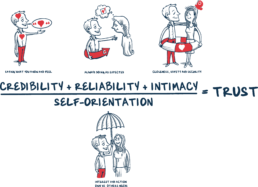

Are You Fenced In?
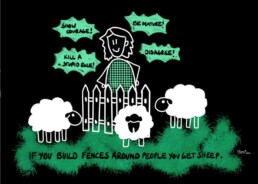

Do you know the feeling of being fenced in and you cannot act and behave like you would genuinely do?
Inspired by a fantastic impulse talk by Anja Förster from the Initiative ‚Rebels at Work’ back in 2019 the following metaphor still sticks in my mind.
If you build fences around people you get sheep’.
With this post we want to ask something of you all!
Take a stand, be bold and show courage, disagree and foster healthy debates with others, allow yourself to think out-of-the-box. In many cases these are the behaviours that lead to brilliant ideas, help to strengthen relationships, generate surprising insights and support you in building high-performing teams.
Have you been fenced in? How did you remove those barriers?
